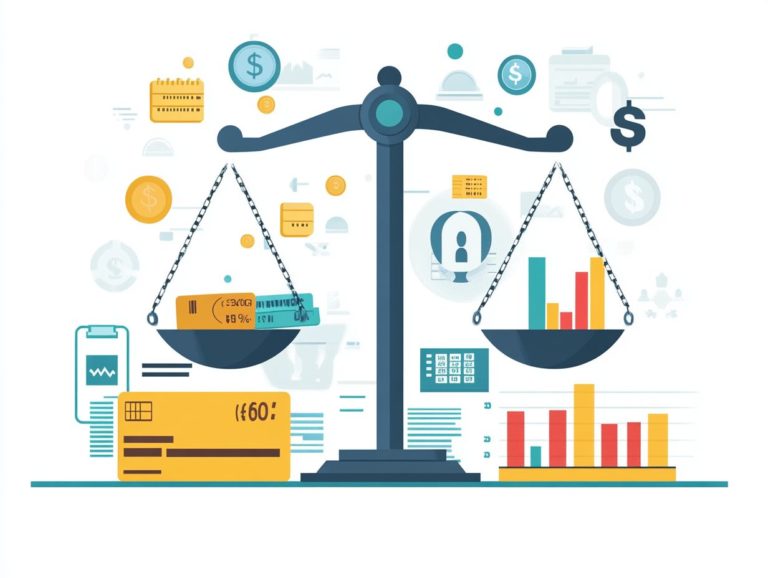The Future of Credit Scoring: Trends to Watch
Credit scoring is evolving at a remarkable pace, influenced by innovative technologies and the shifting needs of consumers.
Let s explore the latest trends in credit scoring together, highlighting the integration of alternative data and the transformative effects of artificial intelligence (AI) and machine learning (ML). You will discover the benefits and concerns that accompany these developments, especially regarding consumer access and fairness.
We also explore emerging technologies and potential regulatory changes that have the power to reshape the credit landscape. Engage with us as we navigate this intricate yet vital topic!
Contents
- Key Takeaways:
- Current Trends in Credit Scoring
- Potential Benefits and Concerns
- Future Predictions for Credit Scoring
- Frequently Asked Questions
- What is credit scoring and why is it important?
- What are some current trends in credit scoring?
- How will the future of credit scoring be impacted by technology?
- Will credit scoring become more inclusive in the future?
- How will the pandemic impact the future of credit scoring?
- What should individuals do to improve their credit score in the future?
Key Takeaways:

- Alternative data and advanced technologies like AI and ML are transforming traditional credit scoring methods.
- Personalized credit scoring can provide a more accurate assessment of an individual’s creditworthiness, but concerns about fairness and access remain.
- The future of credit scoring will likely see a combination of emerging technologies and regulatory changes to address concerns and improve efficiency and accuracy.
What is Credit Scoring?
Credit scoring serves as an organized way to evaluate your creditworthiness, enabling financial institutions to determine whether to extend loans or credit to you. This assessment typically involves a close examination of your credit history, which includes outstanding debts, payment patterns, and your overall financial behavior.
Various scoring models then translate this data into a numerical score, reflecting the likelihood of you defaulting on your obligations. Understanding credit scoring is essential in today s financial landscape, as it directly influences lending decisions and the opportunities available to you.
Credit reports are crucial in this process, offering a comprehensive snapshot of your financial past, including any delinquencies, bankruptcies, or court judgments that may impact your score. Lenders rely on this information to conduct effective risk assessments, ensuring responsible lending practices that safeguard both their interests and yours.
The interplay between your credit history, consistent repayment habits, and the diversity of your credit accounts can significantly affect your overall score. This underscores the importance of maintaining sound financial habits for future lending opportunities.
Current Trends in Credit Scoring
As the financial services landscape evolves, you ll see how exciting changes in technology are shaping credit scoring today, particularly advancements in AI and ML.
Traditional credit scoring methods relied heavily on historical data. Now, the integration of alternative data sources is transforming how lenders evaluate borrowers. Real-time factors, such as economic conditions and financial behaviors, are becoming integral to scoring models, resulting in a more nuanced understanding of a borrower s creditworthiness.
This shift enhances predictive analytics and opens the door to greater financial inclusion, particularly for those who are unbanked.
Use of Alternative Data
The use of alternative data in credit scoring is steadily gaining traction. This approach allows you to assess the creditworthiness of borrowers who might not have traditional credit histories. It harnesses non-traditional data sources think utility payments, rental history, and even social media behavior to paint a more comprehensive picture of a borrower s financial habits.
By incorporating alternative data, you can extend credit opportunities to unbanked individuals and contribute to greater financial inclusion. These novel data sources provide you with real-time insights into consumers financial behaviors, significantly enhancing the accuracy of credit assessments.
While this leads to increased approval rates and the chance to offer tailored credit products, it s essential to remain aware of the inherent risks, such as privacy concerns and potential biases in the data collected.
Striking the right balance is key. While alternative data can foster more responsible lending practices and lower default rates, it also prompts critical questions regarding fairness and transparency in credit score generation. Ultimately, successfully integrating these data sources can pave the way for a more equitable financial landscape.
Artificial Intelligence and Machine Learning

Artificial Intelligence (AI) and machine learning are revolutionizing credit scoring. They significantly enhance how we assess credit risk. By leveraging sophisticated computer methods, you can analyze vast amounts of data and uncover patterns that traditional scoring systems might miss. This gives you the power to make more informed lending decisions based on ongoing assessments that adapt to changes in borrower creditworthiness.
These technologies help you gain a deeper understanding of the factors influencing creditworthiness. This explainability of models is vital for fostering transparency. It builds trust between you and borrowers while encouraging responsible lending practices.
By mitigating credit default risk through real-time analysis and fine-tuning lending criteria, AI and machine learning support a more equitable financial ecosystem. This ultimately benefits you, the consumer, and the economy as a whole.
Personalized Credit Scoring
Personalized credit scoring marks a transformative shift in how you, as a borrower, are evaluated by lenders. Gone are the days of cookie-cutter scoring models; instead, lenders now utilize tailored assessments that reflect your individual financial behaviors.
By harnessing advanced financial analytics and customer segmentation techniques, institutions create more nuanced evaluations of your creditworthiness. They take into account your unique circumstances and profile. This personalized approach enhances the accuracy of credit assessments and fosters stronger relationships between you and your lenders, promoting responsible lending.
Understanding diverse financial behaviors is essential. It allows lenders to gain insights into your spending habits, income fluctuations, and payment histories. With machine learning at their disposal, lenders sift through large amounts of data, identifying patterns that traditional models might miss. This leads to the creation of bespoke credit profiles that more accurately represent your ability to repay.
By recognizing and adapting to your unique financial journey, lenders can make informed decisions that not only mitigate risk but also promote financial inclusion. This ensures you access vital credit opportunities finely tailored to your specific needs.
Potential Benefits and Concerns
Exploring the potential benefits and concerns of evolving credit scoring practices is crucial for grasping their impact on financial inclusion and responsible lending. By integrating AI and alternative data, you can significantly improve access to credit for underrepresented populations while effectively minimizing the risk of credit defaults.
However, not everything is perfect. It’s important to remain vigilant about the accompanying concerns regarding consumer protection, data privacy, and the possibility of decision bias in automated lending processes.
Impact on Consumer Access and Fairness
The impact of modern credit scoring systems on your access to credit and overall fairness is significant, especially if you re unbanked. Enhanced financial inclusion through innovative scoring models offers opportunities for those who have been previously excluded.
However, you should be aware of potential decision biases that could perpetuate inequalities in access. It’s essential to ensure robust consumer protection to strike a balance between the benefits of wider access and fairness in lending practices.
These systems can unintentionally put you at a disadvantage if you have limited credit histories or come from marginalized communities. This can lead to a troubling cycle of exclusion. While strides are being made to incorporate alternative data that better reflects your repayment capabilities, the implementation often suffers from a lack of proper guidelines and transparency.
Tackling these decision biases is not merely a fairness issue; it is crucial for maintaining trust in the financial system. By prioritizing equitable lending practices and critically evaluating the algorithms behind credit scoring, we can contribute to a fairer landscape for all borrowers, including you.
Efficiency and Accuracy

Efficiency and accuracy in credit scoring are crucial for you as a financial institution striving to make informed lending decisions. By harnessing predictive analytics an approach that uses historical data to forecast future events and advanced modeling techniques, you can streamline your assessment processes. This enhances the precision of creditworthiness evaluations.
This leads to a quicker and more dependable scoring process that benefits both you and your borrowers. Ultimately, it enriches the entire lending experience.
Integrating machine learning algorithms which help computers learn from data to improve their accuracy over time allows you to analyze vast datasets. This reveals patterns that traditional methods might miss. As these technologies advance, you gain the ability to make decisions that are not only faster but also grounded in deeper insights into borrower behavior.
This evolution significantly reduces the risk of defaults, boosts consumer trust, and fosters financial inclusion by enabling a wider range of applicants to access credit. As a result, this technological transformation has the potential to revolutionize the financial services landscape, making it more efficient and equitable for everyone involved.
Future Predictions for Credit Scoring
Get ready! The future of credit scoring is about to change dramatically, propelled by emerging technologies and shifting regulatory landscapes. As financial institutions adopt increasingly sophisticated models and embrace data-driven strategies, you can anticipate a movement toward more transparent and adaptable credit scoring systems.
This evolution will reshape borrower assessments and transform lending practices and regulatory frameworks in the coming years. It ensures that credit scoring evolves in harmony with changing economic conditions.
Emerging Technologies and Methods
Emerging technologies are transforming the credit scoring landscape, providing innovative solutions that significantly enhance the accuracy and reliability of borrower assessments. With AI solutions leading the charge, you can harness diverse data sources and advanced scoring models to gain deeper insights into borrowers’ financial behaviors and creditworthiness.
This technological evolution not only refines traditional credit scoring methods but also paves the way for greater financial inclusion and responsible lending.
Machine learning algorithms are a game-changer in this arena. They allow you to analyze vast datasets to identify trends and predict borrowing behavior with remarkable precision. Big data analytics further empower you by integrating non-traditional data points, such as social media activity and transaction histories, giving you a more holistic view of an individual’s potential risk.
As these technologies enhance scoring models, you can better serve underserved populations and create tailored financial products. Ultimately, you cultivate a lending system that reduces risk and promotes economic growth.
Regulatory Changes and Implications
Regulatory changes are poised to significantly shape the future of credit scoring. They directly influence how you and other financial institutions assess risk and uphold consumer rights. As governments roll out new policies aimed at enhancing consumer protection and data privacy, credit scoring practices will need to adapt to align with these evolving regulations.
These changes are not merely procedural; they strive to cultivate a fairer lending environment while placing a premium on the protection of personal data a matter of increasing importance in our technology-driven financial landscape.
By implementing stringent guidelines, authorities aim to ensure that consumers receive equitable treatment. This emphasizes the need for trust and accountability within the financial sector.
As this landscape shifts, it s imperative for institutions like yours to proactively reassess methodologies. Make necessary adjustments that not only meet current requirements but also anticipate future regulatory changes. This balanced strategy is crucial to preserving the integrity of credit scoring while simultaneously fostering innovation that benefits borrowers.
Frequently Asked Questions

What is credit scoring and why is it important?
Credit scoring helps lenders assess how likely borrowers are to repay their debts. It considers various financial factors.
This process is crucial because it enables lenders to make informed lending decisions.
What are some current trends in credit scoring?
Current trends include using alternative data, like rental payments and utility bills, to assess creditworthiness. Artificial intelligence and machine learning are also being utilized to enhance accuracy and speed.
How will the future of credit scoring be impacted by technology?
Technology will significantly influence the future of credit scoring. With advances in AI and machine learning, scoring models will become more accurate and efficient.
Alternative data and digital platforms will also play a key role in shaping credit scoring.
Will credit scoring become more inclusive in the future?
Efforts are underway to make credit scoring more inclusive. Alternative data and new scoring models can help those with limited or no credit history access credit.
There are also initiatives aimed at eliminating bias and discrimination in credit scoring algorithms.
How will the pandemic impact the future of credit scoring?
The pandemic has strained finances for many, which has affected credit scoring processes. Lenders may need to adapt their methods to reflect the pandemic’s impact on credit history.
The rise of alternative data and digital platforms during this time may also continue to influence credit scoring.
What should individuals do to improve their credit score in the future?
Individuals should maintain a good credit history by making timely payments and keeping credit card balances low. They should also limit new credit applications and regularly check their credit reports for errors.
Staying informed about current credit scoring trends can help individuals make better financial decisions.






